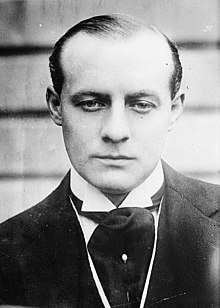Baron Hillingdon
Baron Hillingdon, of Hillingdon in the County of Middlesex, was a title in the Peerage of the United Kingdom held by the Mills family.

The family descended from William Mills, who married Elizabeth Digby. Their son was Charles Mills, a Director of the Honourable East India Company and a member of the Council of India. On 17 November 1868 he was created a Baronet in the Baronetage of the United Kingdom.[1] He was succeeded by his only son, Charles Henry Mills, who became the second Baronet. He married Lady Louisa Lescelles, and was a banker and Conservative politician. On 15 February 1886 he was raised to the Peerage of the United Kingdom as Baron Hillingdon, of Hillingdon in the County of Middlesex. The title was created with remainder to the heirs male of the grantee lawfully begotten.[2]
When he died the titles passed to his eldest son, the second Baron, Charles William Mills. He was also a banker and Conservative politician. He was married to The Hon. Alice Harbord, and was succeeded by his son, the third Baron, Arthur Robert Mills, due to his eldest son, Charles Thomas Mills being killed in action. The second Lord Hillingdon's probate was sworn in 1919 at £1,000,000 (equivalent to about £46,300,000 in 2019) as was that of his mother at a little over 5% of that sum.[3] The third Baron was married to The Hon. Edith Mary Cadogan, daughter of the Viscount Chelsea, whose sister married The 10th Duke of Marlborough. The third Baron sat as Conservative Member of Parliament for Uxbridge.
When he died the titles passed to his eldest son, the fourth Baron, Charles Hedworth Mills, who died on 6 May 1978,[4][5] The title then passed to the third Baron's first cousin, Patrick Charles Mills, son of Geoffrey Edward Mills, sixth son of the first baron.[6] He died in 1982.[7]
The Mills family partly owned the London bank Glyn, Mills & Co.[8] and held close business relationships with the Rothschild family. Hillingdon Court, built by Sir Charles Mills, 1st Baronet in 1858, served as the preferred family home until it was sold in 1919. At that time it served alongside Overstrand Hall on the Norfolk coast and The Wildernesse, Sevenoaks, since renamed Dorton House, a key part of a community in which the family support charitable activities. Relatives of the Barons Hillingdon, in the form of the wife and later family of Robert Everist have instead repaired and taken in hand Lound Hall, Nottinghamshire.[9]
Mills Baronets, of Hillingdon Court (1868)
- Sir Charles Mills, 1st Baronet (1792–1872)
- Sir Charles Henry Mills, 2nd Baronet (1830–1898) (created Baron Hillingdon in 1886)
Barons Hillingdon (1886)
- Charles Henry Mills, 1st Baron Hillingdon (1830–1898)
- Charles William Mills, 2nd Baron Hillingdon (1855–1919)
- Hon. Charles Thomas Mills (1887–1915)
- Arthur Robert Mills, 3rd Baron Hillingdon (1891–1952)
- Charles Hedworth Mills, 4th Baron Hillingdon (1922–1978)
- Patrick Charles Mills, 5th Baron Hillingdon (1906–1982)
See also
References
- "No. 23439". The London Gazette. 10 November 1868. p. 5812.
- "No. 25559". The London Gazette. 16 February 1886. p. 744.
- https://probatesearch.service.gov.uk Calendar of Probates and Administrations
- "Deaths." Times [London, England] 8 May 1978: 32. The Times Digital Archive. Web. 17 July 2016
- "Lord Hillingdon." Times [London, England] 9 May 1978: 21. The Times Digital Archive. Web. 17 July 2016
- Burke's Peerage, 1939 edition, P 1302
- Gravestone Photographic Resource - Charles Henry Mills grave monument in St Peter and St Paul church burial ground, Seal, Kent, England
- Royal Bank of Scotland Heritage Hub - People - Charles William Mills
- "Latest Kent Sevenoaks news | Kent Live". Sevenoakschronicle.co.uk. 2017-02-23. Archived from the original on 2015-09-24. Retrieved 2017-03-16.
External links
- Hansard 1803–2005: contributions in Parliament by Charles Henry Mills, 1st Baron Hillingdon
- Hansard 1803–2005: contributions in Parliament by Charles William Mills, 2nd Baron Hillingdon
- Hansard 1803–2005: contributions in Parliament by Arthur Robert Mills, 3rd Baron Hillingdon